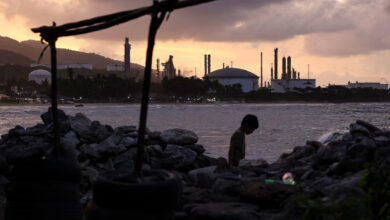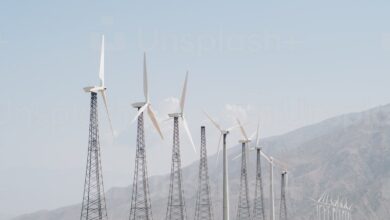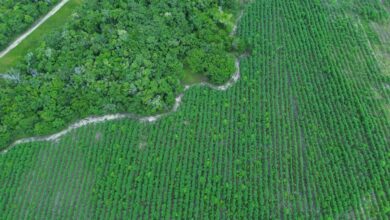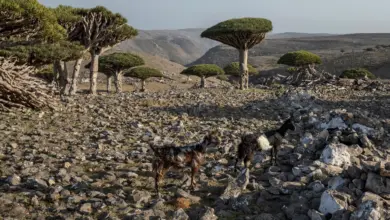Around Rosetta, the dramatic effects of climate change can already be seen. Along the city, famous for the stone that bears its name, the west branch of the Nile gently flows into the Mediterranean. But behind this peaceful facade lies a troublesome reality.
For centuries, the waters of the Nile have been used for agriculture. But six years ago, farmers began taking water from canals, which bring water in from much farther afield, to irrigate their lands. The reason for the change was the rising salinity of river water in the area. Since then, salinity levels have steadily risen, making the river water almost as salty as sea water.
According to Mamdouh el-Hattab, researcher at the Institute for Environmental Studies and Research and consultant for the government on environmental issues, the area is in great danger.
“Water in this part of the Nile differs in no way from sea water," he said. "Rising salinity levels have infected the groundwater and, through that, the soil. The whole region is suffering.” With the use of satellite photos, el-Hattab and his colleagues can see the salt “eating the earth like a cancer and making it less and less fertile.”
Local farmer Ahmed el-Barawy confirms this. “The productivity of the land has gone down over the years”, he said.
In an arid part of his farm, the withered remains of what used to be a green and productive plot can still be seen. “This is what happens”, he said, pointing to the dead crops. “Many farmers around me have switched to fish farming, moved to more fertile areas or are using extensive amounts of fertilizers. But all these options cost money, and that’s something I don’t have.”
Due to the degradation of previously fertile areas, many farmers in the region are bringing in sand from the ancient dunes with which the region is riddled. Combined with fertilizers, this sand can temporarily ease the problem. But in the long term, this solution actually ends up exacerbating the issue, noted El-Hattab.
“Not only do they disrupt and destroy the region’s ecological balance by taking sand from the dunes, they also end up impoverishing the land even more by using more fertilizers," he said. "But the negative effects cannot be seen right away. The poor farmers–who don’t really understand the problem–turn to these short-term solutions.”
Rising salinity levels, however, are not the only problem facing the area. Global sea levels are on the rise, while some parts of the region are situated below sea level. In the 1990s, a wall was constructed on both sides of the river to keep the sea at bay. This wall is now partly flooded.
This rise in sea levels is helped along by the decreasing amounts of water being brought in by the Nile. In the past, the river brought in more silt than was taken by the sea, making Egypt a little larger every year. But for years now, the amount of water that actually reaches the sea has been on the wane. And the water that does reach the sea contains far too little silt to keep up with the sea’s land-grabbing.
Furthermore, parts of the land around Rosetta are subject to subsidence due to the extraction of gas from the ground. Just off-shore of Rosetta, a gigantic gas field has been mined since 1997. The extraction of large volumes from under the earth causes the land to sink, augmenting the danger of rising sea levels.
According to Director of the Central Laboratory for Agricultural Climate Mosaad Hassanein, the government is starting to wake up to the problem. On a future map of Egypt based on predictions of rising sea levels worldwide, he points to the area around Rosetta. The area is almost completely blue, which means it is submerged under water. “This is without taking into account the subsiding of the land, which is taking place simultaneously," he said.
“The government is still in the research phase," Hassanein explained. “Strategies for more efficient agriculture have been developed, and we’re now passing this knowledge along to farmers. The farmers must be educated on irrigation methods and on which cultivars [varieties of plant selected for specific characteristics] to use when.”
“Besides that, we will finally start monitoring rising sea levels in Egypt this year," he said. "With this data, we can be a lot more accurate in our estimates and take the right precautions.”
Another measure currently being worked on by the government is the reclamation of fertile land. Egypt is the most arid country in the world, 86 percent of which is unsuitable for agriculture. If the population grows and predictions on climate change are accurate, expanding into the dessert will be essential, according to Hassanein.
But for many, these measures won’t be nearly enough. According to El-Hattab, "many people in Egypt, including policymakers and scientists, still don’t want to accept the dangers of climate change. They say erosion is as old as Egypt itself, and that it isn’t something human beings have an influence on. Sometimes, I really think we need a catastrophe in order to act.”
Meanwhile, farmers around Rosetta are skeptical. As long as fertilizers are affordable, they aren’t particularly worried. Besides, el-Barawy believes, the future of the land is in God’s hands. “All I can do is continue working and do my best to support my family of five,” he said.




